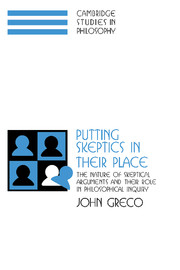 Putting Skeptics in their Place
Putting Skeptics in their Place Book contents
- Frontmatter
- Contents
- Preface
- 1 The Nature of Skeptical Arguments and Their Role in Philosophical Inquiry
- 2 Skepticism about the World: Part One – Reconstructions
- 3 Skepticism about the World: Part Two – Dismissive Responses
- 4 Skepticism about the World: Part Three – Dualism, Realism, and Representationalism
- 5 The Argument from an Infinite Regress of Reasons
- 6 Hume's Skepticism about Unobserved Matters of Fact
- 7 Agent Reliabilism
- 8 Agent Reliabilism and the Relevant Sense of “Relevant Possibility”
- 9 Moral and Religious Epistemology
- Bibliography
- Index
5 - The Argument from an Infinite Regress of Reasons
Published online by Cambridge University Press: 03 November 2009
- Frontmatter
- Contents
- Preface
- 1 The Nature of Skeptical Arguments and Their Role in Philosophical Inquiry
- 2 Skepticism about the World: Part One – Reconstructions
- 3 Skepticism about the World: Part Two – Dismissive Responses
- 4 Skepticism about the World: Part Three – Dualism, Realism, and Representationalism
- 5 The Argument from an Infinite Regress of Reasons
- 6 Hume's Skepticism about Unobserved Matters of Fact
- 7 Agent Reliabilism
- 8 Agent Reliabilism and the Relevant Sense of “Relevant Possibility”
- 9 Moral and Religious Epistemology
- Bibliography
- Index
Summary
In the first four chapters I have been claiming that skeptical arguments play an important role in philosophical inquiry. Such arguments act as heuristic devices for driving positive epistemology in particular, as opposed to ontology or philosophy of mind. I mean this thesis to be both prescriptive and descriptive. On the one hand, I am claiming that skeptical arguments ought to play this methodological role. On the other, the claim is that such arguments do in fact play it. Nothing supports the descriptive thesis more than the literature on the skeptical argument from an infinite regress of reasons. That argument is beautifully simple, but it has inspired debate over the nature of knowledge and evidence for over two millennia.
THE REGRESS ARGUMENT AND STRONG PARTICULARISM
The problem arises because it seems that one must have good reasons for whatever one claims to know. But not any reason is a good reason; one must have reasons for thinking that one's reasons are true. Accordingly, it seems that knowledge requires (per impossibile) an infinite regress of reasons. An early version of the argument is attributed to the ancient skeptic, Pyrrho. The passage quoted next is taken from Sextus Empiricus's discussion of Agrippa's five skeptical modes leading to the suspension of judgment. Agrippa, in turn, was systemizing the skeptical teachings of Pyrrho.
- Type
- Chapter
- Information
- Putting Skeptics in their PlaceThe Nature of Skeptical Arguments and their Role in Philosophical Inquiry, pp. 108 - 136Publisher: Cambridge University PressPrint publication year: 2000


